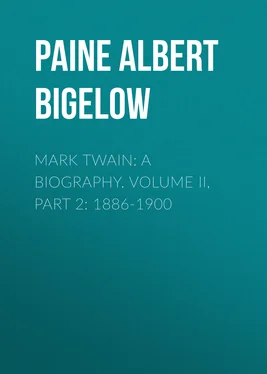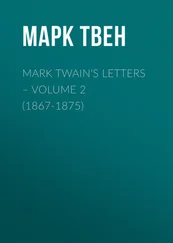Albert Paine - Mark Twain - A Biography. Volume II, Part 2 - 1886-1900
Здесь есть возможность читать онлайн «Albert Paine - Mark Twain - A Biography. Volume II, Part 2 - 1886-1900» — ознакомительный отрывок электронной книги совершенно бесплатно, а после прочтения отрывка купить полную версию. В некоторых случаях можно слушать аудио, скачать через торрент в формате fb2 и присутствует краткое содержание. Жанр: Биографии и Мемуары, foreign_antique, на английском языке. Описание произведения, (предисловие) а так же отзывы посетителей доступны на портале библиотеки ЛибКат.
- Название:Mark Twain: A Biography. Volume II, Part 2: 1886-1900
- Автор:
- Жанр:
- Год:неизвестен
- ISBN:нет данных
- Рейтинг книги:4 / 5. Голосов: 1
-
Избранное:Добавить в избранное
- Отзывы:
-
Ваша оценка:
- 80
- 1
- 2
- 3
- 4
- 5
Mark Twain: A Biography. Volume II, Part 2: 1886-1900: краткое содержание, описание и аннотация
Предлагаем к чтению аннотацию, описание, краткое содержание или предисловие (зависит от того, что написал сам автор книги «Mark Twain: A Biography. Volume II, Part 2: 1886-1900»). Если вы не нашли необходимую информацию о книге — напишите в комментариях, мы постараемся отыскать её.
Mark Twain: A Biography. Volume II, Part 2: 1886-1900 — читать онлайн ознакомительный отрывок
Ниже представлен текст книги, разбитый по страницам. Система сохранения места последней прочитанной страницы, позволяет с удобством читать онлайн бесплатно книгу «Mark Twain: A Biography. Volume II, Part 2: 1886-1900», без необходимости каждый раз заново искать на чём Вы остановились. Поставьте закладку, и сможете в любой момент перейти на страницу, на которой закончили чтение.
Интервал:
Закладка:
"That's yours, Colonel. I'm not reading for money these days."
Colonel Johnston, to whom the sum was important, tried to thank him, but he only said:
"Never mind, Colonel, it only gave me pleasure to do you that little favor. You can pass it on some day."
As a matter of fact, hard put to it as he was for funds, Clemens at this time regarded himself as a potential multi-millionaire. The type-setting machine which for years had been sapping his financial strength was believed to be perfected, and ship-loads of money were waiting in the offing. However, we shall come to this later.
Clemens read for the cadets at West Point and for a variety of institutions and on many special occasions. He usually gave chapters from his Yankee, now soon to be finished, chapters generally beginning with the Yankee's impression of the curious country and its people, ending with the battle of the Sun-belt, when the Yankee and his fifty-four adherents were masters of England, with twenty-five thousand dead men lying about them. He gave this at West Point, including the chapter where the Yankee has organized a West Point of his own in King Arthur's reign.
In April, '89, he made an address at a dinner given to a victorious baseball team returning from a tour of the world by way of the Sandwich Islands. He was on familiar ground there. His heart was in his words.
He began:
I have been in the Sandwich Islands-twenty-three years ago—that peaceful land, that beautiful land, that far-off home of solitude, and soft idleness, and repose, and dreams, where life is one long slumberous Sabbath, the climate one long summer day, and the good that die experience no change, for they but fall asleep in one heaven and wake up in another. And these boys have played baseball there!—baseball, which is the very symbol, the outward and visible expression, of the drive and push and rush and struggle of the living, tearing, booming nineteenth, the mightiest of all the centuries!
He told of the curious island habits for his hearers' amusement, but at the close the poetry of his memories once more possessed him:
Ah, well, it is refreshment to the jaded, it is water to the thirsty, to look upon men who have so lately breathed the soft air of those Isles of the Blest and had before their eyes the inextinguishable vision of their beauty. No alien land in all the earth has any deep, strong charm for me but that one; no other land could so longingly and so beseechingly haunt me, sleeping and waking, through half a lifetime, as that one has done. Other things leave me, but it abides; other things change, but it remains the same. For me its balmy airs are always blowing, its summer seas flashing in the sun; the pulsing of its surf is in my ear; I can see its garlanded crags, its leaping cascades, its plumy palms drowsing by the shore, its remote summits floating like islands above the cloud-rack; I can feel the spirit of its woody solitudes, I hear the plashing of the brooks; in my nostrils still lives the breath of flowers that perished twenty years ago.
CLXIX
THE COMING OF KIPLING
It was the summer of 1889 that Mark Twain first met Rudyard Kipling. Kipling was making his tour around the world, a young man wholly unheard of outside of India. He was writing letters home to an Indian journal, The Pioneer, and he came to Elmira especially to see Mark Twain. It was night when he arrived, and next morning some one at the hotel directed him to Quarry Farm. In a hired hack he made his way out through the suburbs, among the buzzing planing-mills and sash factories, and toiled up the long, dusty, roasting east hill, only to find that Mark Twain was at General Langdon's, in the city he had just left behind. Mrs. Crane and Susy Clemens were the only ones left at the farm, and they gave him a seat on the veranda and brought him glasses of water or cool milk while he refreshed them with his talk-talk which Mark Twain once said might be likened to footprints, so strong and definite was the impression which it left behind. He gave them his card, on which the address was Allahabad, and Susy preserved it on that account, because to her India was a fairyland, made up of magic, airy architecture, and dark mysteries. Clemens once dictated a memory of Kipling's visit.
Kipling had written upon the card a compliment to me. This gave it an additional value in Susy's eyes, since, as a distinction, it was the next thing to being recognized by a denizen of the moon.
Kipling came down that afternoon and spent a couple of hours with me, and at the end of that time I had surprised him as much as he had surprised me—and the honors were easy. I believed that he knew more than any person I had met before, and I knew that he knew that I knew less than any person he had met before—though he did not say it, and I was not expecting that he would. When he was gone Mrs. Langdon wanted to know about my visitor. I said:
"He is a stranger to me, but he is a most remarkable man—and I am the other one. Between us we cover all knowledge; he knows all that can be known, and I know the rest."
He was a stranger to me and to all the world, and remained so for twelve months, then he became suddenly known, and universally known. From that day to this he has held this unique distinction—that of being the only living person, not head of a nation, whose voice is heard around the world the moment it drops a remark; the only such voice in existence that does not go by slow ship and rail, but always travels first-class—by cable.
About a year after Kipling's visit in Elmira George Warner came into our library one morning in Hartford with a small book in his hand and asked me if I had ever heard of Rudyard Kipling. I said, "No."
He said I would hear of him very soon, and that the noise he was going to make would be loud and continuous. The little book was the Plain Tales, and he left it for me to read, saying it was charged with a new and inspiriting fragrance, and would blow a refreshing breath around the world that would revive the nations. A day or two later he brought a copy of the London World which had a sketch of Kipling in it, and a mention of the fact that he had traveled in the United States. According to this sketch he had passed through Elmira. This remark, with the additional fact that he hailed from India, attracted my attention—also Susy's. She went to her room and brought his card from its place in the frame of her mirror, and the Quarry Farm visitor stood identified.
Kipling also has left an account of that visit. In his letter recording it he says:
You are a contemptible lot over yonder. Some of you are Commissioners and some are Lieutenant-Governors, and some have the V. C., and a few are privileged to walk about the Mall arm in arm with the Viceroy; but I have seen Mark Twain this golden morning, have shaken his hand and smoked a cigar—no, two cigars—with him, and talked with him for more than two hours! Understand clearly that I do not despise you; indeed, I don't. I am only very sorry for you, from the Viceroy downward.
A big, darkened drawing-room; a huge chair; a man with eyes, a mane of grizzled hair, a brown mustache covering a mouth as delicate as a woman's, a strong, square hand shaking mine, and the slowest, calmest, levelest voice in all the world saying:
"Well, you think you owe me something, and you've come to tell me so. That's what I call squaring a debt handsomely."
"Piff!" from a cob-pipe (I always said that a Missouri meerschaum was the best smoking in the world), and behold! Mark Twain had curled himself up in the big arm-chair, and I was smoking reverently, as befits one in the presence of his superior.
The thing that struck me first was that he was an elderly man; yet, after a minute's thought, I perceived that it was otherwise, and in five minutes, the eyes looking at me, I saw that the gray hair was an accident of the most trivial. He was quite young. I was shaking his hand. I was smoking his cigar, and I was hearing him talk—this man I had learned to love and admire fourteen thousand miles away.
Читать дальшеИнтервал:
Закладка:
Похожие книги на «Mark Twain: A Biography. Volume II, Part 2: 1886-1900»
Представляем Вашему вниманию похожие книги на «Mark Twain: A Biography. Volume II, Part 2: 1886-1900» списком для выбора. Мы отобрали схожую по названию и смыслу литературу в надежде предоставить читателям больше вариантов отыскать новые, интересные, ещё непрочитанные произведения.
Обсуждение, отзывы о книге «Mark Twain: A Biography. Volume II, Part 2: 1886-1900» и просто собственные мнения читателей. Оставьте ваши комментарии, напишите, что Вы думаете о произведении, его смысле или главных героях. Укажите что конкретно понравилось, а что нет, и почему Вы так считаете.












